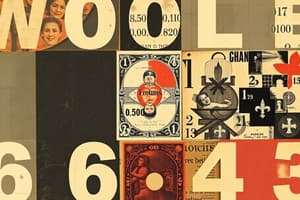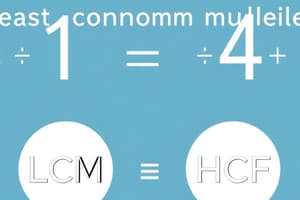Podcast
Questions and Answers
Explain how to find the first three multiples of the number 6.
Explain how to find the first three multiples of the number 6.
The first three multiples of 6 are 6, 12, and 18, obtained by multiplying 6 by 1, 2, and 3.
What is the highest common factor (HCF) of 24 and 36, and how is it determined?
What is the highest common factor (HCF) of 24 and 36, and how is it determined?
The HCF of 24 and 36 is 12, determined by listing their factors: 24 (1, 2, 3, 4, 6, 8, 12, 24) and 36 (1, 2, 3, 4, 6, 9, 12, 18, 36).
Describe the method to find the least common multiple (LCM) of 7 and 3.
Describe the method to find the least common multiple (LCM) of 7 and 3.
To find the LCM of 7 and 3, list the multiples: multiples of 7 (7, 14, 21, 28...) and multiples of 3 (3, 6, 9, 12, 15, 18, 21...), and identify the smallest common multiple, which is 21.
Identify the factors of 15 and explain what makes them factors.
Identify the factors of 15 and explain what makes them factors.
How can prime factorization be used to find the HCF of 30 and 42?
How can prime factorization be used to find the HCF of 30 and 42?
Using the relationship with HCF, calculate the LCM of 8 and 12.
Using the relationship with HCF, calculate the LCM of 8 and 12.
What method would you use to find the LCM of 10 and 15, and what is the answer?
What method would you use to find the LCM of 10 and 15, and what is the answer?
Give an example of finding factors of the number 36 and explain its significance.
Give an example of finding factors of the number 36 and explain its significance.
Flashcards are hidden until you start studying
Study Notes
Finding Multiples
- Definition: Multiples of a number are obtained by multiplying the number by integers.
- Method: For a number ( n ), its multiples can be found by calculating ( n \times 1, n \times 2, n \times 3, ) etc.
- Example: Multiples of 3: 3, 6, 9, 12, 15...
Highest Common Factor (HCF)
- Definition: The HCF of two or more numbers is the largest number that divides all of them without leaving a remainder.
- Methods to Find HCF:
- Listing Factors: List all factors of the numbers and identify the greatest one.
- Prime Factorization: Break down each number into its prime factors and multiply the lowest powers of common primes.
- Division Method: Use the Euclidean algorithm; repeatedly divide and take remainders until reaching 0.
- Example: HCF of 12 and 18
- Factors of 12: 1, 2, 3, 4, 6, 12
- Factors of 18: 1, 2, 3, 6, 9, 18
- HCF = 6
Least Common Multiple (LCM)
- Definition: The LCM of two or more numbers is the smallest number that is a multiple of all of them.
- Methods to Find LCM:
- Listing Multiples: List multiples of each number and identify the smallest common one.
- Prime Factorization: Use prime factorization to identify the highest powers of all prime factors involved.
- Relationship with HCF: ( \text{LCM}(a, b) = \frac{a \times b}{\text{HCF}(a, b)} )
- Example: LCM of 4 and 5
- Multiples of 4: 4, 8, 12, 16, 20...
- Multiples of 5: 5, 10, 15, 20...
- LCM = 20
Definition of Factors
- Definition: Factors of a number are integers that can be multiplied together to yield that number.
- Characteristics:
- A factor must divide the number with no remainder.
- Every number has at least two factors: 1 and itself.
- Example: Factors of 28: 1, 2, 4, 7, 14, 28.
Finding Multiples
- Multiples are produced by multiplying a number by integers.
- For any number ( n ), multiples can be calculated as ( n \times 1, n \times 2, n \times 3, ) etc.
- Example for multiples of 3 includes: 3, 6, 9, 12, 15...
Highest Common Factor (HCF)
- HCF refers to the largest number that can divide two or more numbers without leaving a remainder.
- Methods to find HCF:
- Listing Factors: Identify all factors of each number, pinpoint the greatest.
- Prime Factorization: Factor each number into primes and multiply the lowest common powers.
- Division Method: Utilize the Euclidean algorithm through repeated division until finding a remainder of zero.
- Example: For numbers 12 and 18:
- Factors of 12 are: 1, 2, 3, 4, 6, 12
- Factors of 18 are: 1, 2, 3, 6, 9, 18
- HCF of 12 and 18 is 6.
Least Common Multiple (LCM)
- LCM represents the smallest number that is a multiple of two or more numbers.
- Methods to find LCM:
- Listing Multiples: List multiples of all numbers, find the smallest one that appears in all lists.
- Prime Factorization: Identify maximum powers of all prime factors across the numbers.
- Relationship with HCF: Expressed as ( \text{LCM}(a, b) = \frac{a \times b}{\text{HCF}(a, b)} ).
- Example: For LCM of 4 and 5:
- Multiples of 4 include: 4, 8, 12, 16, 20...
- Multiples of 5 include: 5, 10, 15, 20...
- LCM of 4 and 5 is 20.
Definition of Factors
- Factors are integers that multiply together to create a specific number.
- A factor must evenly divide the number, leaving no remainder.
- Every integer has at least two factors, which are 1 and the number itself.
- Example: Factors of 28 are: 1, 2, 4, 7, 14, 28.
Studying That Suits You
Use AI to generate personalized quizzes and flashcards to suit your learning preferences.




